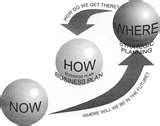They say that you get out of something what you put into it. For the small business owner, though, who is often short on time because they lack the staff and resources to do as much as they like, this may mean that they have to skip steps.
One of these steps is often seen as only necessary for the big guys – the multinationals or corporate powerhouses – and that is business planning. This means that they not only skip quarterly planning, but they also simply ignore it altogether.
Defining Business Planning
Business planning is a formal process for setting goals for your business. It is a strategic process in which you state what you would like to achieve and then figure out what types of tools, skills, knowledge and resources you need to achieve these stated goals.
Often, people equate business planning to something that only happens when a business starts up and then do not give it a second thought once they are rolling. Business planning should be seen as an ongoing process to use to move the business forward to do more and make more.
Understanding the Benefits
To achieve the growth you desire in your business and achieve your goals, it is necessary to create a business plan – a roadmap, if you will – to how you will get to that desired point. If all it took was hoping for the best and working night and day seven days a week, there would be more successful businesses out there. However, just having good intentions does not cut it in a business environment that has become more demanding and more competitive.
Key Components of a Successful Business Plan
There are a number of key components that make up a successful business plan:
- Design a Compelling Competitive Advantage – Define what makes you different and unique in the marketplace. Focus on how your business can stand out to your target audience and select the tactics that will help you communicate this compelling competitive advantage.
- Describe Your Definition of Success – Success means different things to different people. You might think success means sustaining your business through all market cycles or you might believe it is all about growing your customer base. Whatever this definition of success may be, use it as the catalyst for everything you do in terms of strategy and tactics.
- Outline Solution Formula – The business plan is not simply about your success; it must also include that of your clients and prospective customers. Your business plan has to explain how you can alleviate the pain points for your customers and provide them with answers to their concerns. Planning should provide a strategy for solving customer and target market problems, which can tie into your definition of success and your compelling competitive advantage.
Ideas on Making it Work for You
Here are some ways to make business planning work for you:
- Work your way into quarterly planning sessions. Begin with a yearly review of your business and work toward more sessions that get you to stop and think about what you are doing and what you could do better.
- Generate reports that track results on a 90-day timeframe through using business planning software that walks you through the steps and ways to look at your results.
- Post your action plan targets in your office where you can see them to remind yourself that you have certain requirements and assignments that need to be fulfilled and checked on. You would do the same for what you give any of your staff, so make yourself just as accountable.
- Do not focus on how long the business plan needs to be – just hone in on what you need to accomplish. While some may take 20 pages, you may only need a one page outline to state what you need to do.
A Business Planning Partner
While these tips are intended to help you get started and on the right path, it is never easy and still may be confusing. That’s why the GPS market took off – more than one person lacked a sense of direction. And, so it goes with business planning. You do not have to go it along but can look to a GPS, or rather a BPP – business planning partner – who can help you get from Point A to Point B by working with you on establishing – and sticking to – a business plan that is unique to your business and goals. A business planning partner can point you in the right direction and also keep the planning at the top of your mind by working with you on a quarterly basis to review metrics and revamp strategies.
What’s your experience with business planning? Have you found strategies that help you start and stick to business planning? Do you have questions on how to get started? Share your thoughts here.






No comments:
Post a Comment